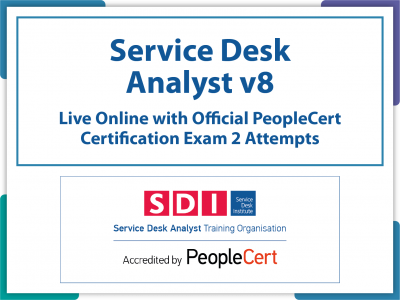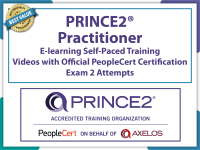The Service Desk Analyst (SDA) Professional Standard qualification recognizes an individual’s knowledge of customer service and support competencies and certifies that they have the skills required to work within the IT service and support industry.
A certified individual will have:
- Essential skills and competencies to deliver efficient and effective support in the Service Desk environment
- Practical knowledge of how to use these skills to deal effectively with a variety of situations
- A clear understanding of how to identify customer needs and motivations, and how to handle difficult situations
- Understand the importance of teamwork in the support environment
- A thorough grounding in the skills, competencies, responsibilities and knowledge required of a professional and effective Service Desk analyst
This course contains everything that is typically core to the role of a Service Desk Analyst:
- Roles and responsibilities: learn everything you need to know about being a professional, efficient, and effective service desk analyst and the key features of delivering service excellence
- Relationship management: discover the importance of collaboration, teamwork, customer relationships and cultural awareness across a global perspective
- Effective communication skills and competencies: explore the principles of good verbal, non-verbal, formal, and informal communication skills, the benefits of active listening and the different ways which people communicate
- Problem-solving: a close look at problem solving techniques, critical thinking, inductive and deductive reasoning, and enhancing your creativity to reach a resolution faster
- Effective rapport and conflict management skills: learn how to develop rapport with your colleagues and customers, understand the importance of good emotional intelligence and how this can aid conflict management and negotiation
- Resilience: understand and develop emotional resilience to help detect and manage both positive and negative signs of stress
- Managing practices, processes, and procedures: establish the need for practices, processes, and procedures for interaction handling and how to create and maintain high-quality documentation
- IT Service Management: learn about the purpose and roles within the service desk of key IT Service Management practices including incident management, service request management, problem management, knowledge management and information security management
- Quality assurance program: review the importance of quality assurance activities, commonly used quality assurance practices, customer satisfaction surveys and the benefits of metrics
- Managing customer feedback: understand the purpose, objectives, and components of successful feedback management
- Support methods: gain an insight into the different methods of delivering support, including the benefits of remote support and self-service
- AI & automation: identify common examples, benefits and challenges of AI and automation within service management









